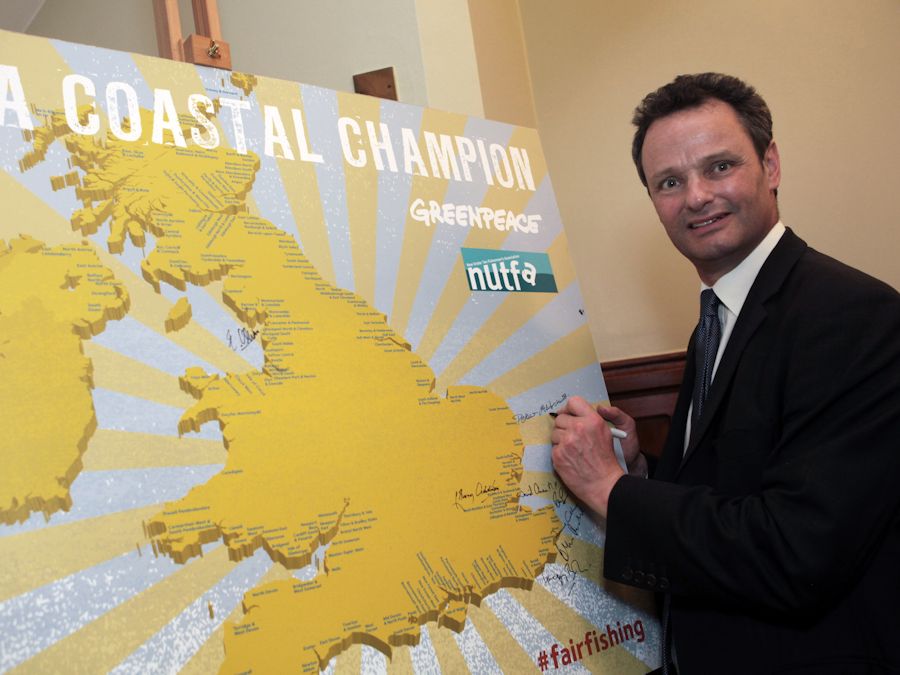16 July 2014
Waveney MP Peter Aldous has pledged to champion the coast and to tackle the economic decline of coastal regions by making sure that local fishing communities are prioritised not penalised when it comes to the allocation of fishing quota and access to fish for small-scale fishermen in Lowestoft.
At an event at the House of Commons on Monday organised by Greenpeace and NUTFA, the representative body for small-scale fishermen, Mr. Aldous was joined by ten MPs and fishermen from around the coast. They promised to raise the issues facing small scale fishermen and coastal communities onto the agenda and into election manifestos across the political parties. They signed up to a five-step plan aimed at regenerating the UK’s inshore waters, fisheries and communities.
Small scale fishermen , our most sustainable fleet, make up over three quarters of the entire UK fleet, but currently they only have access to four per cent of the UK’s quota. The remaining quota is handed to larger scale industry, including huge foreign owned fishing vessels. This has meant the number of UK coastal fishermen who can afford to make a living from fishing has declined and coastal communities, such as Lowestoft, have suffered social, environmental and economic knock on effects.
Last year the European legislation, the Common Fisheries Policy was reformed after sustained lobbying from fishermen, MPs, MEPs and green groups. This legislation now says that governments should give more quota to, coastal fishermen who fish sustainably and bring economic and social benefits to local communities. The campaigners say that this needs to be implemented in order to rebuild sustainable fishing businesses and protect our marine environment. This should also put a halt to the current system that allows large chunks of British quota to fall into the hands of a few foreign fishing businesses, at the expense of local fishermen and the fish stocks that they depend on.
Mr. Aldous commented:
“I know that the fishing community in Lowestoft has really suffered over the years and it’s time to turn the tide so that our local fishermen who bring most benefit to our community and the health of our seas are prioritised not penalised. That’s why I have pledged to become a Coastal Champion to do all I can in Parliament to ensure that the fishermen in Lowestoft and the fish that they depend on are supported.”
Nina Schrank, Oceans Campaigner at Greenpeace said:
“The new European legislation is designed to reward sustainable fishermen; it’s a golden opportunity that the government must not miss. If implemented properly, it will boost fish stocks, bolster home-grown sustainable fishing and breathe new life into our coastal communities up and down the country. It’s time stop destructive, foreign owned vessels hoovering up fish stocks while lining their pockets with subsidies and the sale of fish caught from our shores. The reform of this legislation was not won easily, now it’s up to the government to turn it into a reality here along the UK’s coasts.”
Jerry Percy, Chief Executive of NUTFA said:
“Once busy and thriving, many coastal fishing communities have crumbled, fishing harbours turned into yacht parks and fishing beaches that are no longer home to fishing boats. This is the reality for much of modern coastal England. But there is hope. Hope in new legislation sensibly implemented, hope in the realisation that smaller scale fishermen are not the problem but a solution to many of the challenges facing us and hope that politicians will recognise the wealth that has been lost, but is there to be regained in terms of jobs, fish stocks and reinvigorated communities.”
Photo: Peter Aldous signing a map that outlines the key demands of the campaign

